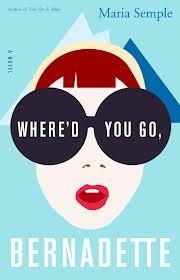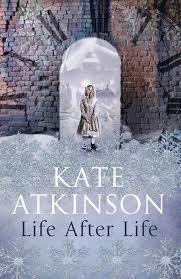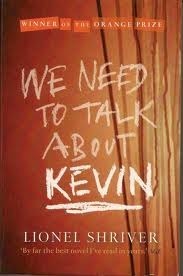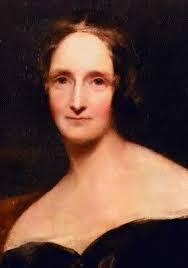Dawn Barker's Blog, page 7
November 3, 2013
On audiobooks
I recently gave a talk on Fractured to hospital staff, and an audience member asked me if it was available as an audiobook. “I don’t think so,” I answered. This woman had enjoyed listening to a reading that I gave from the book, and also felt that some of her patients and their families might benefit from reading Fractured, but because of their health issues, would find it more accessible to listen to rather than read.
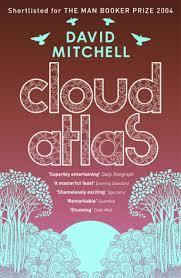
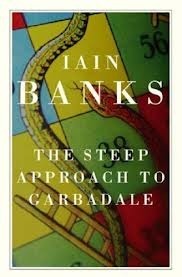
The question came at an interesting time for me, as I’d recently restarted listening to audiobooks myself. I used to listen to them, years ago, when I lived in Sydney. At that time, I spent two to three hours a day driving the 120km round trip to the hospital I worked in. I used to look forward to the drive home at the end of the day, and have quite vivid memories of pulling onto the motorway as I started up my CD player and settled into the story I was ‘reading’. I remember being lost in the stories, particularly David Mitchell’s Cloud Atlas and Iain Banks’s The Steep Approach to Garbadale.
Over the last year, I started running for exercise, and for months, I listened to music as I ran. However, I quickly became bored of listening to the same songs. Music didn’t engage my mind enough, and I couldn’t completely switch off and relax. I then heard about the Moby Dick Big Read project where Moby Dick was being podcast, with each chapter being read by a different narrator, including Tilda Swinton, Stephen Fry, David Cameron and Will Self. I began to listen to this as I jogged, but I’m afraid, like my attempts to read the paper book, that the story failed to engage me.
Then recently, I had to drive from Perth to Margaret River for a writing retreat. I would be in the car for eight hours with no children in the back – bliss! I downloaded an audiobook – Where’d You Go, Bernadette by Maria Semple. That was a perfect choice – it is a story that lends itself very well to being told aloud. For those of you who haven’t read it, it’s a blackly funny book, very contemporary in writing style, and narrated in the first person mainly (albeit with lots of epistolary chapters). It’s not dense (not on the surface, anyway) and very accessible. I loved listening to it, although there were some long sections that seemed to drag a little – sections that perhaps if I had been reading it as a book, I would have skimmed over. But overall, it was a perfect choice.
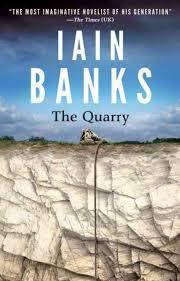
So when I got back to Perth, I decided to try again to use my daily run - at least half an hour a day – to fit in a bit more ‘reading’ time. I started with Ian Banks’s The Quarry, but this wasn’t quite as successful for me as an audiobook. Like Where’d You Go Bernadette, it’s also in the first person, narrated by a teenage boy who has an unspecified Autistic Spectrum Disorder. The actor reads the book in a Northern English accent – appropriate for the setting of the book, but for some reason, the actor’s voice just doesn’t work for me. There are lots of characters, all of whom apparently went to University together, and to distinguish between the, the actor reads their dialogue in different accents and intonations. The narrator’s father – who is terminally ill – speaks in a very broad accent, while his friends have posher versions, and I can’t help but constantly want to point out that there wouldn’t be such differences in the ‘real world’. There are passages in the book that I think would be very moving if I were reading them in my own voice, but when they’re read aloud in a distinctive dialogue, I find it very difficult to switch off and get lost in the prose.
I’ve just started another audiobook: Kate Atkinson’s Life After Life. So far, I’m really enjoying it, though with two narrative threads it can be a bit confusing, and perhaps if I was holding the physical book, I’d be able to flick backwards to make sense of certain details, but I’ll persevere!
In The History of Reading, the author, Alberto Manguel, says that the earliest ‘readers’, in the ancient world, spoke books aloud to themselves, rather than reading silently and internally. (Some other historians don’t believe this – you can read about the controversy here.) I read to my children every night, and love to watch them relax as they listen to a story. And of course, most cultures around the world have a tradition of oral storytelling. So there is something in us that loves listening to a story.
Have you ever listened to an audiobook? Are there books that lend themselves particularly well to being listened to rather than read?
October 22, 2013
Writers ask writers: October book giveaway
This month, my writing group is giving away a pack of TWELVE books to one winner in Australia. Each of us is giving away a copy of our latest published book, as well as a copy of a book that inspired it.
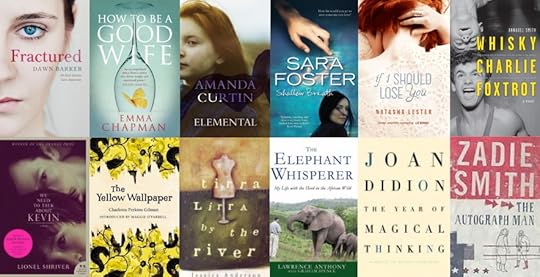
From me, the winner will receive a copy of Fractured and a copy of one of the books that gave me inspiration: We Need To Talk About Kevin by Lionel Shriver.
I read We Need To Talk About Kevin when it first came out, almost ten years ago now! I can still remember how it felt when I started reading it: I had a strong sense of foreboding, of unease, yet I was compelled to read on. I loved how Shriver captured the nuances of marital relationships and parenting and how she brought up some taboo feelings that many people could relate to. The subject matter was horrific, and made even more so by the way she chose to be quite blunt and realistic in the way she wrote. This book didn’t have a Hollywood ending to make it more palatable. There are other books on similar subjects (such as Jodi Picoult’s Nineteen Minutes) but they weren’t as confronting (to me, at least) because they didn’t seem to capture the realism in the way that Shriver did.
I saw her talk about this book years ago at Sydney Writers Festival and I remember the audience gasping when she told us that it had been turned down by dozens of publishers before someone decided to take a chance on it. At that time, I had the premise for Fractured in my mind but one of the many excuses I kept making to stop myself from writing it is that I didn’t think anyone would want to to read about such a confronting subject. But I saw by the huge success of We Need To Talk About Kevin is that lots of people are willing to read things that make them feel emotional or uncomfortable.
The other books in the pack are:
How To Be A Good Wife by Emma Chapman and her choice, The Yellow Wallpaper by Charlotte Perkins Gilman
Elemental by Amanda Curtin and her choice, Tirra Lirra By The River by Jessica Anderson
Shallow Breath by Sara Foster and her choice, The Elephant Whisperer by Lawrence Anthony
If I Should Lose You by Natasha Lester and her choice, The Year Of Magical Thinking by Joan Didion
Whiskey Charlie Foxtrot by Annabel Smith, and her choice, The Autograph Man by Zadie Smith
How to enter
This giveaway is valued at over $300 and you can enter HERE. Good luck!
*postage only within Australia
October 9, 2013
Author interview: Jen S Wight, author of “Day Six – When Motherhood and Madness Collide”
Today – 10th October – is World Mental Health Day, and it seemed fitting to publish an interview today with an Australian writer whose memoir, Day Six – When Motherhood And Madness Collide has just been released.
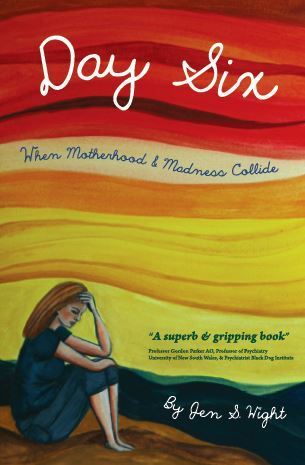 I first heard of this book when Jen contacted me to ask if I’d consider reading her manuscript, an account of her personal experience of postnatal psychosis, which began when her son was six days old. Those of you who’ve read Fractured will know that this is the topic I chose to explore through fiction. I read Jen’s manuscript very quickly, and wrote her the following message:
I first heard of this book when Jen contacted me to ask if I’d consider reading her manuscript, an account of her personal experience of postnatal psychosis, which began when her son was six days old. Those of you who’ve read Fractured will know that this is the topic I chose to explore through fiction. I read Jen’s manuscript very quickly, and wrote her the following message:
“This book is a brave and honest account of what it’s really like to experience a mental illness at the very time when you are expected to be most content: when you’re a new mother. It’s not only a compelling read, but a moving insight into how psychiatric illness affects not only your mind, but also your body, your relationships and the sense of who you are.”
It’s available at your local bookshop, or online here or here
1. Congratulations on the publication of your first book. Can you tell us a little about it?
Thanks Dawn! Day Six is the story of what happened after my son was born 20 months ago. I experienced post-partum psychosis and then severe post natal depression. Though it is a story about a very difficult time, it does give hope that people can recover and go back to their lives just like with any other illness.
2. Your book deals with a highly personal, and often taboo subject – that of maternal mental illness. What were your motivations for writing it?
I started off writing it to get all the wild and weird happenings out of my head and to help me process what had happened. The psychiatrist I was seeing suggested it. I wasn’t thinking about writing something for publication. The Boy had started sleeping for 90 minutes every morning and I suddenly found myself with this time. I think I’d turned a bit of a corner and it just felt like my brain started working properly again. The fog cleared and I started to write.
But about half way through writing the first draft, I started thinking, ‘Hey this might actually help other families going through difficult times.’ By the time I finished the first draft I was keen to find a publisher.
I am passionate about normalising ‘mental’ illness. I’d like a future where it is considered just illness, without the distinction between mental and physical. I mean the brain part of your physical body after all.
I hope that by being open about what happened to me and my road to recovery it will not only give hope to people going through something similar – it will join with the growing voices of people speaking up and help people feel less ‘shame’ about their own or their family member’s experience.
My sister has schizophrenia and I have spent 20 years seeing how people’s misconceptions and fear of her illness make her life even harder than it already is. It feels amazing to be able to do something practical that might – in some way – help my sister.
Really thinking about it – my main motivation in wanting to get this book published is to show solidary to my sister, Jo.
3. Can you tell us about your road to publication?
I was very lucky as I have a friend who runs a boutique publishing company called Green Olive Press. They publish, ‘Stories worth telling, writing worth reading,’ so I’m very proud to be part of that. I asked my friend about Day Six and after some backwards and forwards they agreed to publish it. I have learnt a lot about the publishing process – particularly the difference a skilled editor (or team of editors) can make to a book. The GOP team really helped make Day Six a better book, I believe.
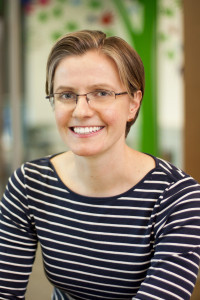
Jen S Wight
4. Your book describes your own experiences of mental illness. Did you have any anxiety about being so open about your vulnerabilities?
I think all authors write their truth. Both in fiction and non-fiction (as Steven King says ‘Fiction is the truth inside the lie.’) We all lay ourselves bare and any critisism of our work, the effort of many months toil and thought, hurts. When you write a memoir you are also opening your vulnerabilities to criticism on deeper levels beyond the literary merit – or otherwise – of your book. People can criticise what actually happened in your actual life, the choices and the mistakes you made. And then beyond that, there is the fact people might judge you for not minding strangers are going to know about the private details of your life, that you actively want people to buy your book and therefore find out all about it in technicolour details.
Perhaps some people think there is something ‘show offy’ and attention seeking about a memoir, that you can be put in the same group as people baring all on day time TV for five seconds of watered down fame.
And then with Day Six there is yet another layer. I think one of the unconscious or concious misconceptions around people who have experienced (or are experiencing) mental illness is that we are mentally flawed, weak and liable to ‘breakdown’ again at the slightest sign of stress and anxiety.That we are unpredictable, out of control and even dangerous.
The other day at work, the printer kept jamming and causing problems like printers do from time to time. There was a group of us around the printer, tutting and pressing various buttons in vain. I said, without thinking, ‘This printer is driving me crazy.’ And there was a pregnant pause as the people around me, who know about my book and me being ill, froze for a second. Did I mean really? Was I all right? Was I going to you know FREAK OUT right there next to the laminating machine?
But I smiled, they smiled and we moved on.
I’m lucky in that I work in the disability sector where people really understand about prejudice and how ‘disabling’ that can be. I don’t think there are many other professions I could have where I wouldn’t worry about being discriminated again. If I was a police women, business women, lawyer, teacher or almost any other profession – I would have found it much harder.
Outside of work, I think people will get used to it and so will I. I’m sure some of the awkwardness must come from me too, as hard as I try to be all cool and breezy about the whole thing. I’d rather people use me to develop new social skills around how to handle someone with my experience, than someone not so robust. It seems like a small price to pay for helping to break down the harmful taboos around this aspect of health.
So you finally to answer your question – yes I do have some anxiety about exposing my vulnerabilities, both as a writer and a person, but I think it will be alright. If I can survive six weeks of mania and pychosis and then month after month of grinding misery and hopelessness of post natal depression, I can cope with a few weird looks and awkward moments, maybe not getting a job I want or friend of a friend not really wanting to talk to me at a party. I can take it.
5. What kind of reactions have you had to your memoir so far?
Really good so far. Since talking to people about the book I’ve been overwhelmed with other women saying they have experienced tough times themselves after the birth of their children, including one women who developed depression 15 years after the birth of her child and other going through it right now. I’ve set up a page on my website where people can share their stories.
I’ve put some of the lovely things people have said about the book on that page too – including your comments!
I haven’t had a bad review or comment yet – though I know it is likely to come. Day Six wont appeal to everyone. I know I’m also butting up against another taboo – that of admitting that motherhood isn’t all soft snuggles, cute socks, rainbows and unicorns. I’m preparing myself to not be too upset when / if it comes but I don’t know how successful I’ll be.
6. What does the future hold for you as a writer?
As a professional fundraiser I write for a living – which I love. So that will obviously continue. I do have an idea for another writing project but nothing concrete yet. Watch this space!
I’m so thrilled that Jen has chosen to share her story – it’s a big step towards increasing the public’s recognition and understanding of mental illness.
You can find out more about Jen on her website, or follow her on Facebook.
September 24, 2013
Writers ask writers: Why Do You Write?
If I was to answer this question based simply on why I am writing right now, it’s because I have a looming deadline for delivery of my second novel to my publisher. Like many people, I find that I need some pressure make sure that every day, while my children nap and after they go to bed, I sit down at the computer and write. I am also encouraged to keep going by the knowledge that I’ll have a second book on the shelves next year, and that I don’t want to be a victim of ‘second novel syndrome’ and fail to live up to the expectations of readers – or myself.
I’m also writing because I’ve loved the experiences of the past six months since Fractured was released: seeing my book in the windows of bookshops, discussing my characters as if they were real with book club members, and being invited to writers’ festivals. I’ve found a career that I love, and I want it to continue – and to do that, I have to write a decent second book!
But when I began writing Fractured, I had none of this to motivate me. I certainly hoped that one day I’d be talking on the stage at the festival instead of sitting in the audience, but it seemed so unlikely. In the early weeks after I began writing Fractured, my husband saw me writing at the kitchen table while bouncing my newborn baby in her chair while she slept. He paused, frowned, than said, ‘You must really love it.’ I recall looking up at him, and realising that he was right. I do love it; I wouldn’t do it otherwise. My life is incredibly busy with three young children, and yet I always make time to write, every day almost without fail. When I’m doing other things, I’m thinking about writing; when I’m reading, I’m comparing the book I’m reading to my own writing; I’m always waiting for the time when I can sit down and try to put the words in my head onto the page.
I enjoy the escape writing gives me from real life, the way it lets me explore my own reactions to complex situations, and the satisfaction of coming to the end of a draft, or sorting out a structural problem. For me, writing is an escape, an intellectual challenge, and an incredibly frustrating puzzle that gives me immense satisfaction when I solve it.
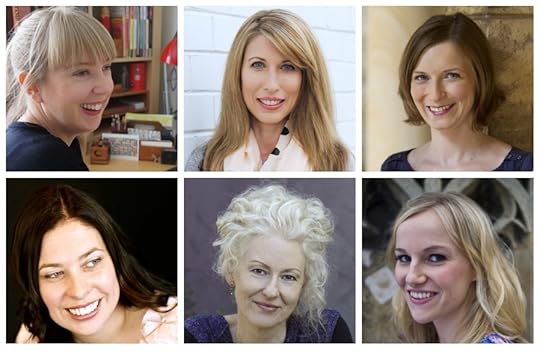
Annabel Smith, Natasha Lester, Dawn Barker, Sara Foster, Amanda Curtin, Emma Chapman
You can read about why the other writers in my group write below:
Amanda Curtin, for whom being a writer is ‘the blood and tissue and neurons of identity’
Sara Foster, who has many reasons, including that ‘there is always something more waiting to be written’…
Annabel Smith describes how she went from being a reader to a full time writer, a passion that now ‘defines’ her…
Natasha Lester who tells us whether writing made her more rich or more beautiful…
Emma Chapman who writes for many reasons, including for ‘the joy of being lost in someone else’s head’
If you’re a writer, why do you do it?
September 8, 2013
Brisbane Writers Festival 2013 wrap up…
I’ve just returned from a tiring but fun weekend at Brisbane Writers Festival. Writing involves spending long hours alone in front of my computer, and this year I’ve been lucky enough to be invited to speak at a few festivals, including Brisbane – a great way to meet lots of other writers and readers.
I flew in to Brisbane last Thursday, and after a quick walk, headed down to the festival venue – The State Library of Queensland – for the opening night. There were speeches, drinks, and a buzz of anticipation in the air.
The next day, I headed out to Everton Park library for a talk about my writing journey and Fractured. I always enjoy library events as the informal setting is a great way to chat with readers, The audience had lots of questions and we had a discussion about mental illness and parenting pressures.
That afternoon, I met another writer, Edwina Shaw, for a chat, and then headed to the Hachette drinks where I was able to meet the Hachette team and authors including Kim Wilkins, Robert Hoge, Dave Lowe, Tony Cavanaugh, Inga Simpson, and Charlotte Nash.
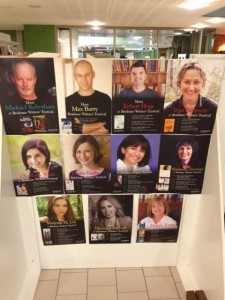
Hachette authors at Brisbane Writers Festival
On Saturday, I had two events: a panel discussion on the medicalisation of pregnancy with Monica Dux (What You Didn’t Expect When You Were Expecting) and Mary-Rose MacCall (The Birth Wars) chaired by Alexandra Payne. I was thrilled to discuss pregnancy and childbirth issues with two women who have written brilliant non-fiction books on pregnancy. We talked about our personal and professional experiences of pregnancy and motherhood and it was lovely to chat to some audience members afterwards – including several midwives, a doctor, and writer Angela Savage.
That afternoon, I took part in a session of readings as part of the Queensland Writers Centre’s ‘Whispers salon’. The theme of the event was Every Side of the Story and it was so lovely to hear some very different authors reading their work: Sean Williams, Clementine Ford, Charlotte Nash and Nina D’Aleo. After that, I was exhausted and met up with some old friends for a drink before heading back to the hotel for room service while watching the election and the Wallabies game!
On Sunday, my final day, I had a lovely breakfast with fellow Hachette author Hannah Richell, then headed to my final panel, “The F Word”, which was a discussion on feminism! I admit that I was a bit anxious about talking on this panel as I felt quite underqualified amongst the company of women who have studied and written widely on the subject. However, as I prepared for the session, I realised that this in itself was something to talk about: why some women are afraid of the “F Word”. It was a really thought-provoking panel, and it really is one of the joys of writers festivals to hear new ideas, and to discuss and debate issues with leading writers and thinkers. It was made even more pleasant by the wonderful nurturing of the chair of the panel, Dale Spender, who brought myself and the other panellists (Monica Dux and Kate De Goldi) champagne and croissants for breakfast on the balcony!
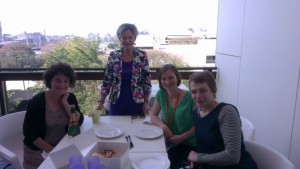
Kate De Goldi, Dale Spender, Dawn Barker and Monica Dux
I had to head to the airport for the flight back to Perth, but managed to find an hour to sit as an audience member and watch another writer’s session: Stuart MacBride, who is a crime fiction writer from my home town of Aberdeen, Scotland. It was lovely to hear a familiar accent and hear him talk about the Scottish weather and food, and afterwards to chat to another Aberdonian in the audience about what we miss about home.
As always, I came home with my suitcase a few kilos heavier with all the books I bought. But as I wrote this blog post on the plane on the way home, I realised I was not as tired as the Wallabies players who sat behind me with facial cuts, black eyes and swollen ears after their hammering by the Springboks!
Thank you to the BWF organisers and volunteers, as well as all the fabulous writers and readers that I met over the weekend, and I hope to see you again another time!
September 2, 2013
Fractured is Australian Women Writers Challenge’s most popular book!
The Australian Women Writers Challenge is a fabulous initiative to help support and promote books written by Australian women. I was thrilled to find out that in their mid-year overview, Fractured has been the most reviewed book!
As a debut author, it’s things like this that really help in a world where people are reluctant to risk their time and money to read a book by an unknown author. I know that taking a chance on a new writer is an investment of time and money, and I’m incredibly grateful not only for those people who have read my book, but to those who have then taken the time to review it.
I too signed up for the challenge at the beginning of the year, hoping to read 10 books by Australian Women Writers but have far surpassed that number already – I’ll write a separate post about that in due time. But there is a huge amount of talent out there and some brilliant writers and books by Australian women.
I was honoured to be interviewed by fellow author, Annabel Smith (author of Whisky Charlie Foxtrot and A New Map Of The Universe) and you can read the interview here. Thanks also to Elizabeth Lhuede!
August 29, 2013
‘Pathologising unhappiness’ – a response
In today’s “The Age”, Sam De Brito has written an article called ‘Pathologising Unhappiness‘ in which he refers to an interview between Katherine Rowland and psychotherapist and author, Gary Greenberg. (You can read the full interview here.)
De Brito’s article discusses Greenberg’s views on the DSM (Diagnostic and Statistical Manual of Mental Disorders) which is referred to several times as a ‘bible’. Greenberg goes as far to say that it is as important to mental health professionals ”as the Constitution is to US government or the Bible is to Christians“.
I should point out that Greenberg is not a psychiatrist, he is a psychotherapist. That doesn’t make his opinion less valid, but a psychotherapist – who is not medically trained – will be seeing patients who are very different to the patients that I see as a psychiatrist. He is very unlikely to be seeing people who are severely mentally ill, who require hospitalisation for a crippling psychiatric illness. Generally, to be suitable for psychotherapy, a patient must be reasonably well functioning, and be insightful into their condition. So, Greenberg’s opinion is skewed by the fact that he is likely to be seeing patients with mild to moderate anxiety and depression as well as unhappiness with their lives. Perhaps this is why De Brito suggests that mental illness is the ‘new delusional denial of human suffering’.
I take issue with a few of De Brito’s comments in his article though, particularly when he suggests that we ‘shrinks‘ have sinister motives:
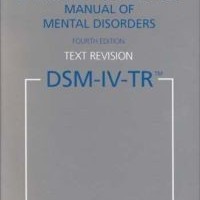
‘once you have a disease or “disorder”, then drug companies and doctors – specifically psychiatrists and psychologists - can charge you to “cure” it or at least pretend they know what’s going on, when often they do not.’
Hmm.
Let me try to explain some of my complicated feelings about DSM. It is certainly not held with the importance that Greenberg suggests, as my Bible or Constitution, but it is necessary for many reasons. A large part of my job as a child psychiatrist is making diagnoses in children who present with all sorts of behavioural disturbances, and I am the first to admit that it can be complicated to work out what is a ‘normal’ response to life events, and what is ‘pathological.’
When I started training in psychiatry, in the UK, we used the European diagnostic system: ICD-10. These manuals essentially have lists of potential diagnoses, and each has a list of criteria under it, a number of which must be met for the patient to be diagnosed with that condition. It can be fairly straightforward for some conditions, but any psychiatrist will tell you that patients don’t always fit into neat boxes, particularly children. A child psychiatrist’s job is to look not only at the child’s presenting symptoms, but to put them into a developmental context. I often see children who may look as if they are, for example, on the autistic spectrum because they have disordered social skills, but really their problems are in the context of a traumatic background/medical condition/anxiety disorder etc.
But diagnostic criteria are necessary: they allow for easier communication between professionals, they are essential for research, and people of course like to have a ‘diagnosis’ particularly if it has a treatment.
The difficulty in psychiatry is that we don’t have a simple test to make a diagnosis. If someone has diabetes, we can test their blood sugar; we can do an xray for pneumonia; a lab test for an infection. Psychiatrists have to use the only information we have: history and observation of behaviour.
One big issue I have with using diagnostic criteria in children is that other agencies – such as schools – will only allocate funding based on diagnosis, not need. I often see children referred by school psychologists for a diagnosis only, and they hope that diagnosis is one which allows them to apply for money to employ a teacher’s aide to help that child in the classroom. I often find myself in an ethical dilemma where I know that a child would benefit from help in the classroom, but they don’t quite meet all the criteria for the ‘right’ diagnosis. Services should be needs based, not diagnosis based.
It is important that the current DSM undergoes a revision to make sure that the diagnoses are evidence based and up to date with the ever expanding knowledge of psychiatric illness, but clinicians, government and non government agencies should remember that we are trying to help a child, not a label. A good psychiatrist will be able to sort through the complicated social, developmental and medical issues that a patient presents with and work out a management plan based on an individual, not a manual. And I am certainly not in cahoots with pharmaceutical companies who do have a history of trying to medicalise normal behaviour (and that’s a whole other blog post…)
As a psychiatrist, I am not a huge fan of DSM, but I certainly don’t pretend to know what’s going on if I don’t, and I don’t see it as an opportunity -as has been suggested today – to rub my hands in glee and charge lots of money for snake-oil.
And any person who has suffered a crippling mental illness will attest to the fact that with or without a controversial diagnostic manual, mental illness is very real.
August 27, 2013
Writers ask Writers: Which writer would you like to be for a day?
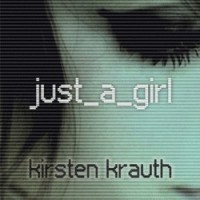
Just_A_Girl by Kirsten Krauth
This month in our Writers Ask Writers series, we are delighted to be joined by guest author Kirsten Krauth, author of Just_A_Girl, which was published in June 2013. You can read more about Kirsten and her novel here. She too is answering this month’s question:
Which writer would you like to be for a day?
My immediate answer was Truman Capote, as I wrote in reply to the same question for another interview a few months ago. Capote lived and wrote at a time when writers were celebrated, he spent long nights partying in New York and arranged the infamous Black and White ball while still producing work of staggering quality. In Cold Blood is one of my favourite books, and I’d love to one day write some non-fiction in that style. But before I could write that post, Annabel Smith sent me her post, and she too is a Truman wannabe! So, I decided to write about someone else instead.
It’s hard to pick one writer. There are some, like Virginia Woolf, whose minds I’d love to be in, but she also had a very severe mental illness that ultimately took her life, so it felt wrong to say I’d like to be her for a day. But when I began to look through many of the writers I love, I realised that so many of them have had difficult lives. I’m not a big reader of poetry, but the exception is Sylvia Plath’s work, which I adore for its ability to show how it feels to be mentally ill – but again, I can’t in all honesty say I would want to live her life, even for a short time.
In the end, I decided to choose Mary Shelley. She had lots of trauma in her life, but she had one wonderful summer that would change her life and propel her into literary history – and that’s what I’d love to experience.
When I recently appeared at the Margaret River Writers Festival, I was part of a ‘book club’ panel where four authors – including me – had to read and discuss a classic book – Mary Shelley’s Frankenstein: or, The Modern Prometheus. It’s a novel that I assumed I had read, but I quickly realised I was mistaken when it began set in Antarctica! The book itself had fascinating themes and metaphors, but, like many classics, was written in a style that didn’t necessarily grab me. Regardless, the image of Dr Victor Frankenstein and his monster is known almost universally (usually from terrible movies). But what’s more intriguing than the book itself is the story about how Mary Shelley came to write it…
In 1816, the 19-year-old Mary Shelley was holidaying in Geneva with a group of other writers: Percy Shelley (her husband), John Polidori and Lord Byron. It is said that the weather was terrible, and the group were stuck in a villa on the shores of Lake Geneva. Unknown to them, a volcano had erupted, blocking the light and making temperatures fall, and it was in that atmosphere that the rained-in group decided to have a competition to see who could write the best horror story.

Villa Diodati, where Shelley began writing Frankenstein
“But,” as Mary wrote in her diary in 1816, “it proved a wet, ungenial summer, and incessant rain often confined us for days to the house.”
Mary initially struggled to come up with an idea for her horror story, but then one night began to have terrible dreams…
“When I placed my head upon my pillow, I did not sleep, nor could I be said to think… I saw – with shut eyes, but acute mental vision – I saw the pale student of unhallowed arts kneeling beside the thing he had put together. I saw the hideous phantasm of a man stretched out, and then, on the working of some powerful engine, show signs of life, and stir with an uneasy, half-vital motion.”
Oh, to have been part of that group of thinkers and writers that strange summer in Italy, lazing around a beautiful villa on Lake Geneva talking about books and stories. And what a feeling it would have been to have dreamed Mary Shelley’s dream, the one that, twelve months later, would become one of the most famous works of literature in the world:
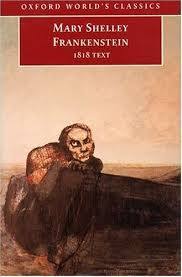
And now, over to the other writers:
Amanda Curtin would like to be… Katharine Susannah Pritchard
Sara Foster… JK Rowling
Annabel Smith … Truman Capote
Emma Chapman… Ernest Hemingway
Natasha Lester… Joan Didion
And our guest author, Kirsten Krauth, would like to be… Leonard Cohen
How about you? Are there any writers who you’d like to be for a day?
August 4, 2013
Interview with DR Dymock, author of ‘Hustling Hinkler’
Back in 2010, when I was part of the Hachette/Queensland Writers Centre manuscript development programme, there was one man in our group – Darryl Dymock. He was unique, not only because the rest of us were women, but because he was the only one of us who was writing non-fiction. And last week, his manuscript was published by Hachette Australia. I’m so thrilled to be interviewing Darryl about his experiences as a writer and his new book!
Oh, and like Darryl, I’m still not sure I know what steam-punk is either…
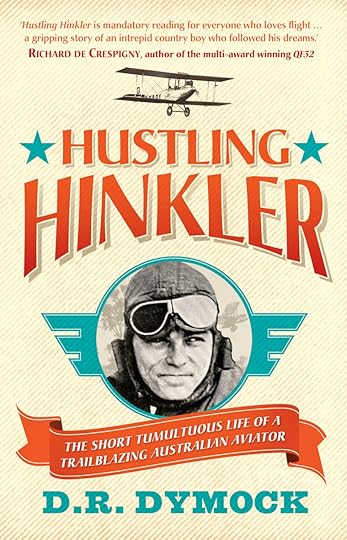
1. Congratulations on the publication of Hustling Hinkler! Can you tell us a little about the book?
Hustling Hinkler tells the intriguing story of Bert Hinkler, a country boy from Bundaberg in Queensland, who became a world-famous long-distance flier, and tragically lost his life at the age of just 40 when he crashed on a snow-covered mountainside in Italy in 1933. Although he was a brilliant pilot and the ‘hero of the day’, as a popular song of the time labelled him, he was also a complex person who struggled to find a place for himself in a rapidly changing world. Not to mention the three grieving women he left behind…
2. The manuscript for Hustling Hinkler was selected for the 2010 Hachette/QWC Manuscript Development Programme. What were some of the important things you learned from this?
• How much work on my book I still needed to do – as I said in a recent blog: ‘I almost cried, I damn near died.’
• How exciting and encouraging it is to be with other dedicated, passionate and supportive writers and tutors
• No matter how good a writer you are, the most important question for a publisher is: Is there a big enough market for your book?
• There’s a literary genre called ‘steampunk’, which I’m still not sure I understand.
3. You are a very experienced writer: you have previously written award-winning short stories (fiction), published a non-fiction title (Extending Your Use-by Date), and are an academic. How did the writing process for Hustling Hinkler, which is narrative non-fiction, differ from the other writing you have done?
In academic writing, we are reporting on our research, and in the field of education we recognise that we are dealing with aspects of human behaviour, which means there are lots of variables. So we tend to shy away from absolutes – we use phrases like ‘tend to’! Our conclusions are hedged with ‘possibly’ ‘it seems’, ‘is is likely that’. Passive voice is favoured because it is believed to be more objective (see how easily I slipped into it in this sentence), and we don’t use contractions. The audience is restricted to other academics and education professionals. Writing Hustling Hinkler drew on the same skills of research and analysis, but I knew I was writing the book for a general readership, so I needed to balance telling his remarkable story with providing sufficient historical context for readers to be able to appreciate the wider world in which he lived. And in narrative non-fiction, as in any good story, active voice reigns supreme, so I had to continually scan to make sure I didn’t slip into the passive.
4. What has been the most enjoyable part of the publication process for you? Has anything surprised you?
• The satisfaction of finally getting it right – hearing from Vanessa Radnidge at Hachette Australia that she thought the latest rewrite was ‘fantastic’
• Signing my first publishing contract
• Seeing the awesome cover online for the first time
• Receiving an advance hard copy of the book in the mail
• Getting lots of encouragement from the people at Hachette and support from other writers, friends and family
• Receiving a generous endorsement pre-publication from Richard De Crespigny, Qantas pilot and author of the multi-award winning non-fiction book, QF32.
• Rubbing shoulders with other authors and feeling that I can legitimately join that band.
Surprises? How thorough the external editor of Hustling Hinkler was, and what goes on behind the scenes before the book is published, especially in pre-promotion.
5. What does the future hold for you as a writer?
• I think I have now found my ‘voice’ in narrative non-fiction, and hope that I can continue to be published in that genre. I’m working on a second book.
• I like the discipline of writing fiction short stories, and although I’ve been successful with a couple of them, I want to further develop my skills in that field.
• My original exploration of Bert Hinkler’s life was through a still unpublished young adult novel, and I’ve received enough professional encouragement of that manuscript for me not to abandon it completely – though it’s still in the bottom drawer.
• I’ll continue with my academic writing while I’m still working in that field. Interestingly, I think my use of language in that area has improved as a result of writing Extending your use-by date and Hustling Hinkler, and I’ve even managed to squeeze a bit more active voice into those fascinating academic journal articles.
You can read more about Darryl on his website. You can buy his book, Hustling Hinkler, from your local bookshop, or online, and it’s also available as an e-book from the usual places.
July 25, 2013
Brisbane Writers Festival 2013

I am really excited to announce that I’ll be appearing at the 2013 Brisbane Writers Festival, which is on from 4-8 September 2013.
I have quite a strong connection with the city. I moved to Brisbane in 2009, when I was seven months pregnant. My first child was born there – and when she was three months old, I began writing Fractured. We then moved back to Perth, but when the manuscript for Fractured was chosen for the 2010 Hachette/Queensland Writers Centre manuscript development programme, I went back to Brisbane (in the third trimester of my second pregnancy!) for the week-long retreat.
I can’t wait to catch up with my Queensland colleagues and old friends, and meet new readers and writers!
I’ll be appearing in three sessions:
Friday 6th September - Author talk and book signing
Everton Park Library, Brisbane, 1-2pm
Free! Bookings on 07 3403 8888
Saturday 7th September - A Natural Process
Auditorium 1, State Library of Queensland, 10-11am
$12-16
Has the medicalisation of pregnancy and childbirth gone too far? Mary-Rose MacColl, Monica Dux and Dawn Barker discuss midwifery, medicine and modern expectations of giving birth
Sunday 8th September - The F Word
Auditorium 2, State Library of Queensland, 10-11am
$12-16
Feminism is back at the forefront of public debate, but haven’t we been here before? Dale Spender, Kate De Goldi, Dawn Barker and Monica Dux discuss the generational cycles of feminism and what it still has to offer.
You can read the full programme here

